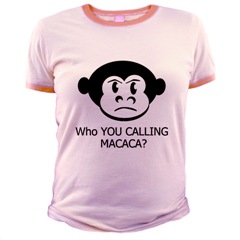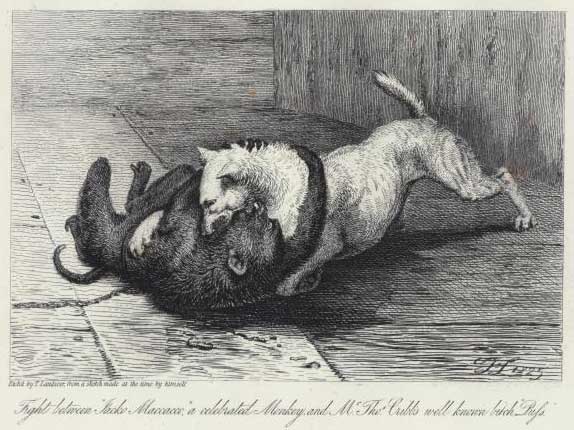August 16, 2006
Makaku, macaco, macaque, macaca...
 By now everyone's no doubt heard about Virginia Senator George
Allen's
unfortunate appellation for S.R. Sidarth, a 20-year-old of Indian
descent working for Allen's Democratic opponent James Webb: [məˈkɑːkə], generally
represented in press accounts and blogs as Macaca. (See the well-traveled YouTube video,
reports in the Washington
Post
and the New
York Times, and blogospheric reactions from Wonkette, Sepia
Mutiny, Andrew
Sullivan, Josh
Marshall, and Ed
Kilgore). Allen addressed Sidarth this way twice: "This fellow
here, over here with the yellow shirt, Macaca, or whatever
his name is... Let's give a welcome to Macaca here." The Allen campaign
claims that Macaca was just a
silly name bestowed on Sidarth, who had been tracking Allen's
appearances with a video camera, based on his Mohawk hair style.
(Sidarth says he has a mullet, not a Mohawk.) But Macaca is also a genus of monkeys
encompassing the macaques,
and macaque and its cognates
are evidently used as epithets for dark-skinned people in various
European languages.
By now everyone's no doubt heard about Virginia Senator George
Allen's
unfortunate appellation for S.R. Sidarth, a 20-year-old of Indian
descent working for Allen's Democratic opponent James Webb: [məˈkɑːkə], generally
represented in press accounts and blogs as Macaca. (See the well-traveled YouTube video,
reports in the Washington
Post
and the New
York Times, and blogospheric reactions from Wonkette, Sepia
Mutiny, Andrew
Sullivan, Josh
Marshall, and Ed
Kilgore). Allen addressed Sidarth this way twice: "This fellow
here, over here with the yellow shirt, Macaca, or whatever
his name is... Let's give a welcome to Macaca here." The Allen campaign
claims that Macaca was just a
silly name bestowed on Sidarth, who had been tracking Allen's
appearances with a video camera, based on his Mohawk hair style.
(Sidarth says he has a mullet, not a Mohawk.) But Macaca is also a genus of monkeys
encompassing the macaques,
and macaque and its cognates
are evidently used as epithets for dark-skinned people in various
European languages.
I won't speculate on whether Allen had any previous knowledge of the monkey genus or macaque-related racial slurs. (Some liberal bloggers are convinced that he must have known about the racial import of macaque, since it's used by some insensitive Francophones to disparage North Africans, and Allen's mother happens to be French Tunisian.) As far as I can tell, Allen's usage was nothing more than a dumb ad-hoc label for "funny-looking foreign guy," which is offensive for reasons having nothing to do with monkeys. Nonetheless, the etymology of macaque and related forms is interesting in its own right.
According to the Oxford English Dictionary, the name for the monkeys
originates in (unspecified) Bantu languages where makaku
is a plural form of kaku
'mangabey':
The form kaku is the name for the mangabey in a number of Bantu languages of southern Gabon and the Congo, and is generally regarded as imitative of the animal's cry. The plural is kaku, bakaku, or makaku, according to the language.
Around 1650 the word began appearing in European accounts of the Congo as makaku (in a vocabulary copied by the Flemish missionary Joris van Geel) and as macaquo (in Historiae Rerum Naturalium Brasiliae by Georg Marggraf/Marcgrav). The term settled into Portuguese as macaco, and by 1680 it appeared in French as macaque. In 1798 the French taxonomist Bernard Germain Étienne de la Ville Lacépède dubbed the genus Macaca, though the scientific name also appeared throughout the 19th century in the more Latin-sounding form Macacus.
Though English borrowed macaque and the genus name Macaca from French, echoes of the earlier Portuguese form macaco continued into the 19th century. John Camden Hotten's Slang Dictionary of 1874 contains an entry for murkarker mentioning a "famous fighting monkey" named "Jacko Macauco, or Maccacco":
The "vulgar Cockney pronunciation" given by Hotten as murkarker is evidently a non-rhotic pronunciation spelling intended to represent [məˈkɑːkə] — which, as it happens, is just about what Senator Allen was caught saying 132 years later.
Courtesy of the New York Public Library Digital Gallery, here is an engraving of a fight between Jacko Maccacco and "Mr. Thos. Cribb's well known bitch 'Puss'":
[Update, 8/16/06: The Hotline gives the latest rationale for Macaca from the Allen camp:
According to two Republicans who heard the word used, "macaca" was a mash-up of "Mohawk," referring to Sidarth's distinctive hair, and "caca," Spanish slang for excrement, or "shit."
Said one Republican close to the campaign: "In other words, he was a shit-head, an annoyance." Allen, according to Republicans, heard members of his traveling entourage and Virginia Republicans use the phrase and picked it up.
In the words of Wonkette, "Shittiest. Explanation. Ever."]
[Update, 8/19/06: Mark Liberman weighs in on the new explanation here.]
Posted by Benjamin Zimmer at August 16, 2006 01:15 AM
